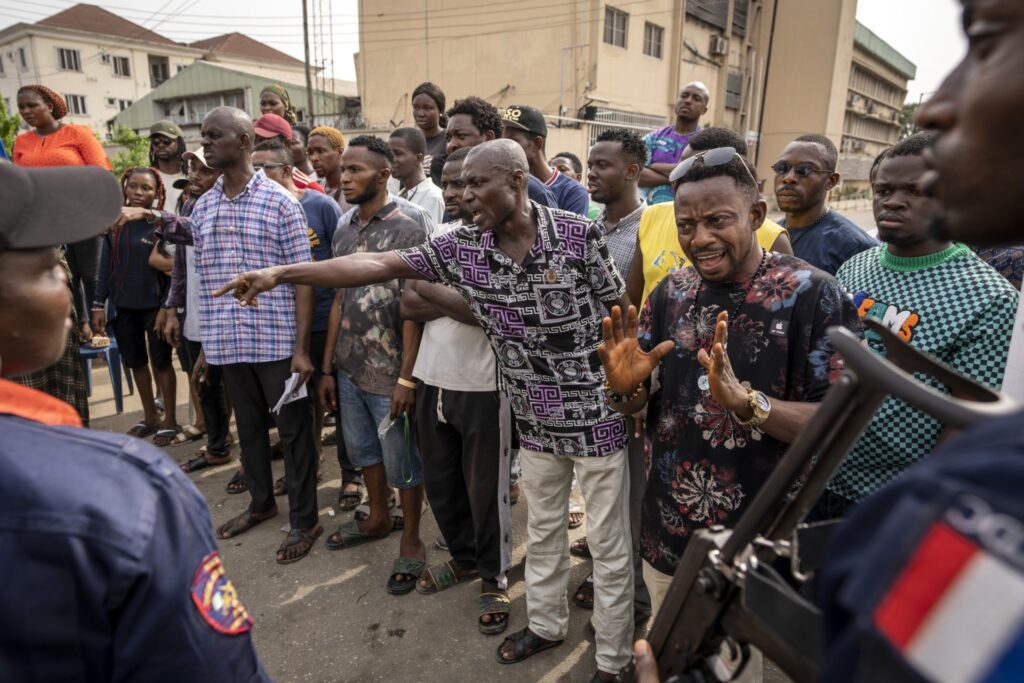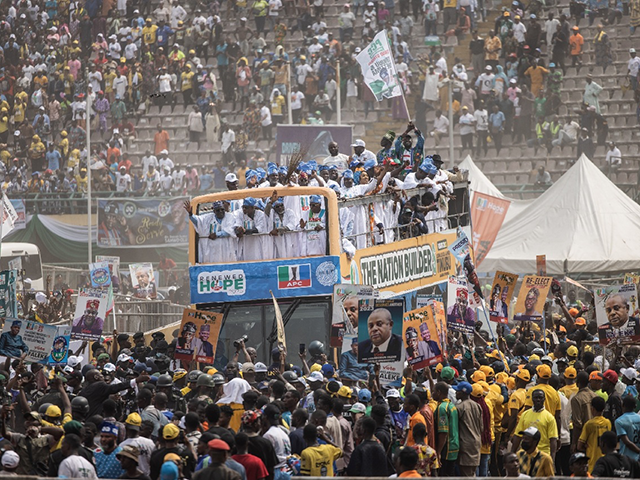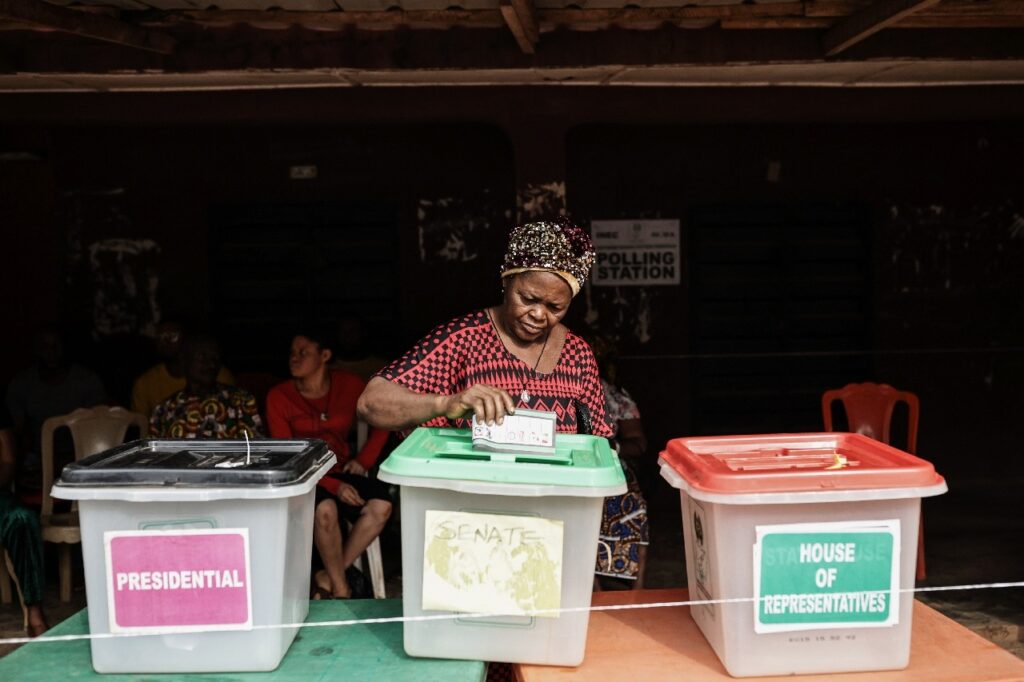Young voters organized a protest in front of the headquarters of Nigeria’s top electoral oversight body on Monday, objecting to slow presidential election results and widespread allegations of election integrity violations in Saturday’s nationwide vote.
Nigerians went to the polls on Saturday to elect their new president and choose among candidates for seats in the National Assembly, the federal legislative body, after months of one of the most intense campaigns in the democratic history of the country. Incumbent President Muhammadu Buhari of the All Progressives Congress (APC) is term-limited out of office, leaving the field open.
For the first time in modern Nigerian history, the APC and opposition People’s Democratic Party (PDP), which have traded the presidency back and forth since Nigeria returned to an elective republic in 1999, are facing a significant third-party challenge from candidate Peter Obi and his Labour Party. Polls prior to the election showed Obi with tremendous support among young Nigerians, a critical if unpredictable voting bloc, but too many undecided voters for experts to pick a winner.
Obi is an Igbo Christian – in contrast to the APC’s Bola Tinubu, a Yoruba Muslim, and the PDP’s Atiku Abubakar, a Fulani Muslim like Buhari – making him a less likely option for many voters in the Muslim-majority north. Abubakar and Tinubu are also vying for the Muslim vote against a fourth candidate, New Nigeria Peoples Party (NNPP) candidate Rabiu Kwankwaso, also of Fulani background.
The campaign has been marred by weeks of violence, including attacks on polling stations, threats to prospective voters to not show up to the polls, and the assassination of a Labour Party senate candidate last week.
To win, a Nigerian presidential candidate must, in addition to achieving a plurality of votes, win at least 25 percent of the vote in two-thirds of the country’s states (24 states). If no candidate achieves this, the country must hold a runoff election between the top candidates.

Party agents argue as they observe vote counting at a polling station in Lagos, Nigeria Saturday, February 25, 2023. Voters in Africa’s most populous nation are heading to the polls Saturday to choose a new president, following the second and final term of incumbent Muhammadu Buhari. (AP Photo/Ben Curtis)
Nigeria’s Independent National Electoral Commission (INEC) has slowly posted results from the country’s 36 states. As of Monday, the INEC has not posted results for most states.
At press time, the few vote totals that have trickled out place Tinubu in the best overall position, but the candidate — a former governor of Lagos — lost the state to Obi in a major upset.
“The results in Lagos are pretty extraordinary,” Nigerian professor Abiodun Adeniyi told the U.K. Guardian. “It’s a sign of the fatigue Lagosians have with Tinubu, who has held the state for the last 20 years. Obi is coming from a distant place and … has shown his message of change resonates with Nigerians.”
The loss prompted Tinubu to issue a statement urging his supporters not to engage in violence in response.
“The fact that the APC narrowly lost Lagos State to another party should not be the reason for violence. As a democrat, you win some, you lose some,” Tinubu’s statement read. “We must allow the process to continue unhindered across the country while we maintain peace and decorum.”
Protesters began assembling in front of the International Conference Centre, the INEC’s vote-counting headquarters in the national capital Abuja, on Monday, demanding more transparency in the vote-counting process. According to Nigeria’s Daily Post, the protesters accused INEC of potentially aiding in vote manipulation, carrying signs reading “Nigeria not for sale” and calling the process a disgrace.
Reports online indicated that similar protests had broken out at local INEC headquarters in states outside of the capital.
The Labour Party formally accused INEC of “manufacturing” election results — including in Lagos, where Obi won — in a statement on Sunday.
The next day, the party issued a statement demanding INEC declare Obi the winner.
“It’s no longer news that the election that was conducted on 25th Febreuary, [sic] 2023 is marred by massive irregularities; and could not just be regarded as a political disappointment but has consequentially endengered Nigeria democracy,” the statement, signed by Labour Party youth leader Prince Kennedy Ahanotu, read. “An election where the electoral umpire INEC deliberately refused to respect their establishment Act the ‘Electoral Act 2022.’ An election where the people’s popular choice at the various polling units across Nigeria is under serious geopardy. sic].”
“It is now obvious to us that some unscrupulous elements hiding under the electoral umpire and in visible partnership with the electoral umpire INEC have concluded to derail our growing democracy. This is unacceptable,” the statement asserted. “We hereby demand … That His Excellency Mr Peter Obi be declared the winner of 2023 Presidential Election and be returned as elected with the popular demand principle.”
The Labour Party has published videos on social media it claims show election machines functioning irregularly.
PDP representatives similarly complained before the INEC headquarters. Dino Melaye, the top representative at the INEC, walked out on Monday, calling the institution “compromised” by the APC and refusing to “rubber stamp” the results.
Of particular controversy were the results from Ekiti state on Monday, which the PDP and Labour Party complained were impossible, as more people allegedly voted than the number of registered voters prior to the election. Tinubu was declared the winner in that state.
“I worked on the result as presented and I discovered that we have 987,647 registered voters in Ekiti and 301,558 accredited. The result that was presented yesterday, APC had 201,494. If you subtract that from 301,558, what you have left is 100,064,” Melaye, the PDP representative, explained before walking out. “Out of this 100,064, PDP scored 89,554. If you subtract that from the balance of 100,064, what is left is 10,510 and now it was also recorded that the Labour Party had 12,397 when the total left is 10,510. Meaning an over figure of 887.”
“You will see from that presentation yesterday that the figure did not add up. There was over-voting and the number of votes outnumber the number of accredited votes and we know exactly what the law says concerning that. I move that should be considered because Ekiti cannot stand,” Melaye asserted.
The INEC dismissed the complaint, accusing the PDP and Labour Party, which claimed to come to the same irreconcilable vote totals, of using incorrect data.
Independent election observers have corroborated the laments of the protesters, describing the election as falling “well short of Nigerian citizens’ reasonable expectations.”
In remarks on Monday, members of the International Republican Institute (IRI) and National Democratic Institute (NDI) Joint Election Observation Mission (IEOM) condemned the government for its poor handling of the vote.
“Inadequate communication and lack of transparency by the Independent National Electoral Commission (INEC) about their cause and extent created confusion and eroded voters’ trust in the process,” the head of the mission, Joyce Banda, said. “The combined effect of these problems disenfranchised Nigerian voters in many areas, although the scope and scale is currently unknown.”
The independent observers listed a variety of problems, from voters being unable to reach voting stations to the electronic vote transfer system failing to send tallies to a centralized counting location in time, as damaging the integrity of the vote.


COMMENTS
Please let us know if you're having issues with commenting.